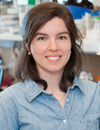James ClintonSenior Scientist, American Type Culture Collection (ATCC) James Clinton is a Senior Scientist and group leader in Research & Development at ATCC. His team is working on the development and commercialization of advanced, physiologically relevant in vitro models utilizing primary and induced pluripotent stem cells, as well as exploring recently emerging culture techniques such as 3D organoids and co-culture approaches. |
Mindy GoldsboroughChief Scientific Officer, ATCC As the Chief Science and Technology Officer for ATCC, Mindy works across ATCC’s business units and functions to develop and implement the scientific and technology strategy in support of organizational goals. Additionally, she oversees the ATCC Cell Systems (ACS) business unit located within Maryland’s High Technology Corridor in Gaithersburg, MD. ACS is the innovative cell biology product and technology development arm of ATCC. Its current focus is in areas of functional cell biology supporting basic and translational research. |
M. Laura MartinDirector of ex vivo Models, Englander Institute for Precision Medicine, Weill Cornell Medicine M. Laura Martin, Ph.D., is leading the Organoid Platform at Englander Institute for Precision Medicine. The Organoid Platform focus in the utilization of patient-derived models of cancer, studying the functional impact of genetic and epigenetic alterations in preclinical models, and investigating the potential to translate these findings to clinical relevance. She is also focusing in the expansion of the ex-vivo model program, improve the rate of successful model development, and increased applications for which ex-vivo models are used for research across campuses. |




